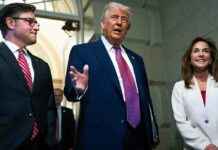The tariffs that were put in place by the Trump administration are expected to have a big impact on the U.S. economy, according to a presentation from Apollo Global Management. Torsten Slok, who is the chief economist at Apollo, shared a timeline with clients that shows when the tariffs could start affecting the economy. He mentioned that due to the time it takes for goods to travel from China to the U.S., consumers might start noticing shortages in stores as early as next month. This could lead to empty shelves and lower sales for companies. Slok even compared the situation to the shortages experienced during the Covid pandemic.
The timeline provided by Apollo Global Management is as follows:
– April 2: Tariffs announced, containership departures from China to U.S. slowing
– Early-to-mid May: Containerships to U.S. ports come to a stop
– Mid-to-late May: Trucking demand comes to a halt, leading to empty shelves and lower sales for companies
– Late May to early June: Layoffs in trucking and retail industries
– Summer 2025: recession
In addition to the tariff impact timeline, the presentation also presented data showing a decline in new orders for businesses, earnings forecasts, and capital spending plans in recent weeks. Despite some tariffs being paused, duties on goods from China have been increased. Treasury Secretary Scott Bessent mentioned on CNBC that the current tariff standoff with Beijing is “unsustainable” and tariffs on Chinese goods have reached a high rate of 145%.
While China is not the sole provider of consumer goods, it plays a significant role in the U.S. economy. The U.S. imported a substantial amount of goods from China in 2024, making it one of the top trading partners. Although many experts predict a recession in 2025, Slok’s outlook is more pessimistic. Bessent, on the other hand, anticipates a period of economic adjustment due to trade negotiations but not necessarily a recession.
There are indications of a surge in orders before the tariffs were announced, which could help maintain stocked shelves for a longer period than initially expected. Analyst Aneesha Sherman mentioned that stock levels are still up for the year and demand is slowing down, suggesting that empty shelves may not be a concern just yet.
As the trade war continues to escalate, it remains uncertain how the economy will be impacted in the coming months. With tariffs affecting various industries and consumer goods, the potential for a recession looms large. The next few months will be crucial in determining the extent of the economic fallout from these tariffs and how it will ultimately affect everyday Americans.

























